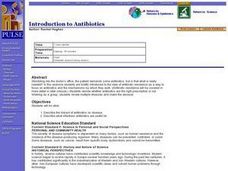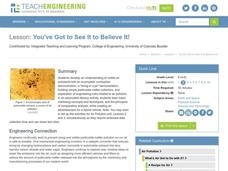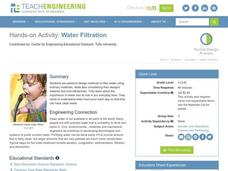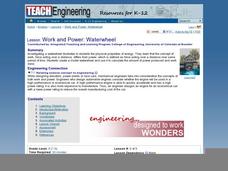Curated OER
Introduction to Antibiotics
Students describe the impact of antibiotics on disease. They describe what infections antibiotics are useful for. Students are introduced to the idea of antibiotic resistance as a way to focus on antibiotics and the mechanisms by which...
Curated OER
TSA Chapter Team (Written & Oral)
Students identify and describe how technology is how humans modify the world around them to meet their needs and wants or to solve problems and extend their capability. They also identify how communication, electrical, fluid,...
Curated OER
Genes: The Building Blocks of Life
Students examine various topics on genetics. Students explore the Internet to gather information on genetic testing, genetically engineered food, forensics, DNA and cloning. They research and determine the best way to fund each of the...
Teach Engineering
How a Hybrid Works
Work with your class to connect series and parallel circuits to hybrid cars. The lesson introduces basic circuit diagrams before having scholars apply the understanding of the difference between parallel and series circuits to hybrid cars.
Curated OER
You've Got to See It to Believe It!
Fifth graders examine smog and particulate matter as two major visible air pollutants. They discover how the pollutants formed and how engineers work on visible air pollution. They design an advertisement for a hybrid vehicle.
Curated OER
Water Filtration
Students work together to examine the role of water in their lives. They discover the process to clean water so it is clean for one to drink. They explore the role of environmental engineers and their problem of getting clean water to...
Curated OER
Design a Paraplegic Equestrian Saddle
Students investigate a problem and background information including the typical capabilities /limitations of a paraplegic. They develop an understanding of the attributes of engineering design.
Curated OER
Science: Designer genes
Students engineer new organisms using biotechnology. In small groups, they write procedures, list benefits and drawbacks, and explain how their new organism might affect the environment. After creating their new organisms, they present...
Curated OER
What is a Robot?
Students study robots and define what makes something a robot. In this robot lesson students identify several different robots and the tasks that they do.
Curated OER
Windmills: Putting Wind Energy to Work
Students review engineering design process and discuss how wind can be used to help get work done. They look at a variety of windmills, focusing on different materials used in construction of windmills.
Curated OER
Flying With The Wright Stuff
Students explore the history of flight, specifically the Wright brothers. Pupils create paper airplanes. They discuss considerations in building an aircraft such as drag, thrust, and weight. Classmates compare the Wright Brother's...
Curated OER
What Interests You?
Fourth graders investigate math in the real world using internet search methods to locate career fields of interest. They select an occupation, and draft brief paragraphs that reflect insight as to why that occupation interests them.
Teach Engineering
Swinging Pendulum
Get into the swing of things. Pupils use a pendulum to demonstrate the conversion of potential energy to kinetic energy and back. After measuring the speed of a pendulum and compare it to the calculated theoretical speed, they determine...
Teach Engineering
Android Acceleration
Prepare to accelerate your Android. Pupils prep for the upcoming activity in this third installment of a four-part series. The lesson progresses nicely by first introducing different types of acceleration to the class. The teacher...
Curated OER
Swinging Pendulum
Students engage in an activity which demonstrates how potential energy (PE) can be converted to kinetic energy (KE) and back again. Given a pendulum height, students calculate and predict how fast the pendulum will swing by understanding...
Teach Engineering
Projectile Magic
What do the movies October Key and Harry Potter and the Sorcerer's Stone have in common? The fourth installment of a five-part module presents equations regarding projectile motion and how to rearrange them. Scholars view video clips...
Teach Engineering
Bouncing Balls
How high will it bounce? Groups determine the height different balls bounce off of different surfaces. By performing the necessary calculations, they determine the initial and final momentum of the balls. The included worksheet provides...
Teach Engineering
Magical Motion
Make solutions to projectile motion problems magically appear using equations. Pupils watch a clip from a Harry Potter movie and find the length of time it takes for a remembrall to fall into Harry's hands. They use a projectile motion...
Teach Engineering
Circuits and Magnetic Fields
Have your class use compasses to try to find the magnetic field around an electric current. Groups use the same technique to visualize magnetic fields as they did in the second activity in the series, but this time, the field is created...
Teach Engineering
Connect the Dots: Isometric Drawing and Coded Plans
Individuals discover how to draw cubes on triangle-dot paper. They use cubes to build structures and draw corresponding isometric drawings on dot paper in the second lesson of the series of five. The activity also introduces the concept...
Teach Engineering
Forms of Linear Equations
Linear equations are all about form. The fifth part in a unit of nine works with the different equivalent forms of linear equations. Class members become familiar with each form by identifying key aspects, graphing, and converting from...
Teach Engineering
Matching the Motion
It is not always easy to walk the straight and narrow. In the sixth portion of a nine-part unit, groups actively recreate a graph depicting motion. Individuals walk toward or away from a motion detector while trying to match a given...
Teach Engineering
Statistical Analysis of Flexible Circuits
Scholars connect statistical analysis with flexible electric circuits. They first learn about flexible circuits and their applications through a PowerPoint presentation and then consider how the fabrication process for these circuits...
Curated OER
Work and Power: Waterwheel
Students investigate a waterwheel and the physical properties of energy. For this waterwheel lesson students create a model waterwheel and calculate the amount of power produced.

























